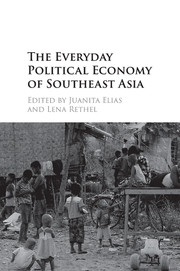Book contents
- Frontmatter
- Epigraph
- Contents
- List of Figures and Map
- List of Tables
- Notes on Contributors
- Acknowledgements
- Part I Introduction
- Part II From Development to Multiple Modernities
- 2 Policies and Negotiated Everyday Living: A View from the Margins of Development in Thailand and Vietnam
- 3 Neoliberalism, Resource Governance and the Everyday Politics of Protests in the Philippines
- 4 Everyday Agents of Change: Trade Unions in Myanmar
- Part III Widening and Deepening Markets
- Part IV People, Mobilities and Work
- Part V Conclusion
- Index
- References
4 - Everyday Agents of Change: Trade Unions in Myanmar
from Part II - From Development to Multiple Modernities
Published online by Cambridge University Press: 05 August 2016
- Frontmatter
- Epigraph
- Contents
- List of Figures and Map
- List of Tables
- Notes on Contributors
- Acknowledgements
- Part I Introduction
- Part II From Development to Multiple Modernities
- 2 Policies and Negotiated Everyday Living: A View from the Margins of Development in Thailand and Vietnam
- 3 Neoliberalism, Resource Governance and the Everyday Politics of Protests in the Philippines
- 4 Everyday Agents of Change: Trade Unions in Myanmar
- Part III Widening and Deepening Markets
- Part IV People, Mobilities and Work
- Part V Conclusion
- Index
- References
Summary
Introduction
On 1 May 2013, members of trade unions in Yangon openly celebrated International Workers’ Day for the first time in decades. In previous years, members of the Federation of Trade Unions of Burma (FTUB) had crossed the border from Thailand into Myanmar, accompanied by troops from the armed wing of the Karen National Union, to hold clandestine Mayday celebrations in Karen villages. Union organizers would give speeches and lead discussions about the core labour rights guaranteed by the International Labour Organization (ILO). In the villages they passed through, they would gather reports of forced labour and other abuses by military units commanded by the ruling State Peace and Development Council (SPDC). When five union activists attempted to hold a Mayday meeting in Yangon in 2007, they were arrested and sentenced to lengthy jail terms.
In 2013 it was different. Union activists, together with other political prisoners, had been released from prison. The union federation, renamed the Federation of Trade Unions of Myanmar (FTUM), held their annual celebration on a public stage in Myanmar's largest city, attended by hundreds of members of newly legalized trade unions along with the deputy labour minister and an official from the ILO liaison office in Yangon. The day before, at a Labour Organisations Conference sponsored by the ILO, union members elected delegates to the ILO conference in Geneva. Those delegates subsequently participated in the ILO's decision to lift sanctions previously imposed on Myanmar for non-compliance with international labour standards. Union activists had been instrumental in persuading ILO member-states to impose sanctions on Myanmar's military regime in 2000 and in working with the ILO to establish processes to monitor and combat forced labour. In 2013, unions were moving from the margins to the centre of Myanmar's national politics and preparing to take up the challenge of organizing a movement capable of transforming the conditions faced by ordinary workers.
In the following discussion of Myanmar's reforms and the evolving industrial relations regime, I highlight the agency of workers and union organizers as everyday actors in shaping the conditions of economic governance and the role of trade union organizations as emerging structures that are beginning to act as bridging mechanisms between everyday and elite politics.
- Type
- Chapter
- Information
- The Everyday Political Economy of Southeast Asia , pp. 72 - 92Publisher: Cambridge University PressPrint publication year: 2016
References
- 2
- Cited by

